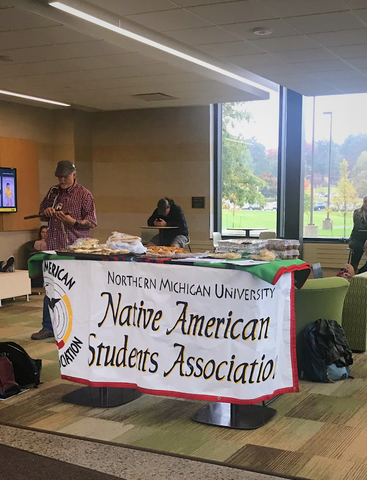Boozhoo gakina (hello everyone), it is with great joy and excitement that I am finally able to share with you that on July 30, 2020, the NMU Board of Trustees approved the recommendation to recognize Indigenous Peoples’ Day on the university calendar on the second Monday of October each year. This official recognition of Indigenous Peoples’ Day by Northern Michigan University has been one the Native American Student Association’s goals for a long time, and as such, this is seen as a great achievement for current and past NASA members, and for the Native American community at Northern Michigan University as a whole.
Indigenous Peoples’ Day is a momentous holiday that recognizes the past and current state of colonization for Indigenous Peoples. It celebrates our fortitude and resiliency to continue our Indigenous ways of life. Parts of our cultures, languages, and histories have been lost in the past, and are in danger of continuing to be lost today. This day reminds us of our responsibility as today’s Indigenous Peoples to reclaim our Indigeneity.
This official recognition wouldn’t have been possible without the support of key allies from the campus community and the Marquette community at large. In particular, we’d like to say miigwech (thank you) to the Center for Native American Studies, the Associated Students of Northern Michigan University, their current President Emma Drever, and past President Cody Mayer, as well as the School of Education, Leadership, and Public Service, the President’s Committee on Diversity, the Office of Diversity and Inclusion, the Multicultural Education and Resource Center, the Marquette City Commission, and the Morning Thunder drum group.
Moving forward, Indigenous Peoples’ Day will be celebrated on NMU’s campus every year on the second Monday of October. Our hope is that this holiday will center around educating others about the process of colonization and the celebration of Indigeneity.
Miigwech, thank you for your support. We hope to see many of you at the first official Indigenous Peoples’ Day, no matter what the format is, on October 12, 2020.
In a three-way dueling column article published by The North Wind on Oct. 10, 2019, Panek shared an explanation of the importance of recognizing Indigenous Peoples Day, entitled Rewriting Faded Ancestral History. That piece is included below to mark the years-long struggle which advocates of Indigenous Peoples’ Day persisted through.
Walking into your morning lecture, you notice the whiteboard in the front of the room has remnants of the past classes’ writing. It looks like beautiful writing done in many diverse languages, there are characters drawn that you can’t make out. The curiosity in you grows the longer you study the whiteboard and your sense of wanting to know what was written builds inside of you. But, the door opens suddenly and loudly, your professor walks in, ready to begin class.
The professor begins by writing his new writing, on top of the remnants. You understand his writing right away, and you almost forget about trying to read what was written before. The professor doesn’t forget though, his writing is interrupted by these remnants, these remnants are staining his writing. He first uses some whiteboard cleaner to scrub away the remnants, but the marks linger. The professor applies more force, scrubbing harder and harder, faster and faster, but they just won’t fade away. He is getting angrier and angrier, and he grabs his red marker and draws all over these remnants, trying to hide what was left. Eventually, he covers the whole board in red marker, and by the time he is done, the class is already over, and everyone leaves the room.
You’re now left alone in the quiet and empty classroom. You erase the red marker with care, making sure to not erase the remnants that were still left underneath. Slowly, you begin to rewrite those remnants. As you are rewriting the remnants, more students start to file in. One student is Maori, one student Anishinaabe, another Wixáritari, Tuvan and Mupache. All of them are smiling, happy to join in to rewrite our languages, our cultures, our traditions, our histories.
We all begin to celebrate together, speak together in our Indigenous languages, dance traditional dances, and sing our traditional songs. We are celebrating our diversity.
There have been many attempts to erase these remnants and to remove any sign of what was written before, but my ancestors and Indigenous peoples are resilient, and they made sure that our cultures would survive no matter how much force is used.
Indigenous Peoples’ Day is a day to honor those ancestors who ensured the survival of our cultures and a day to continue to rewrite our faded histories. We, as Indigenous youth, are rewriting and celebrating our cultures, languages, and histories. Indigenous Peoples’ Day is a day to rewrite and celebrate our diverse Indigenous cultures, languages, and histories. Indigenous Peoples’ Day is a day to make our writing visible again. It is a day to celebrate our Indigeneity.






















